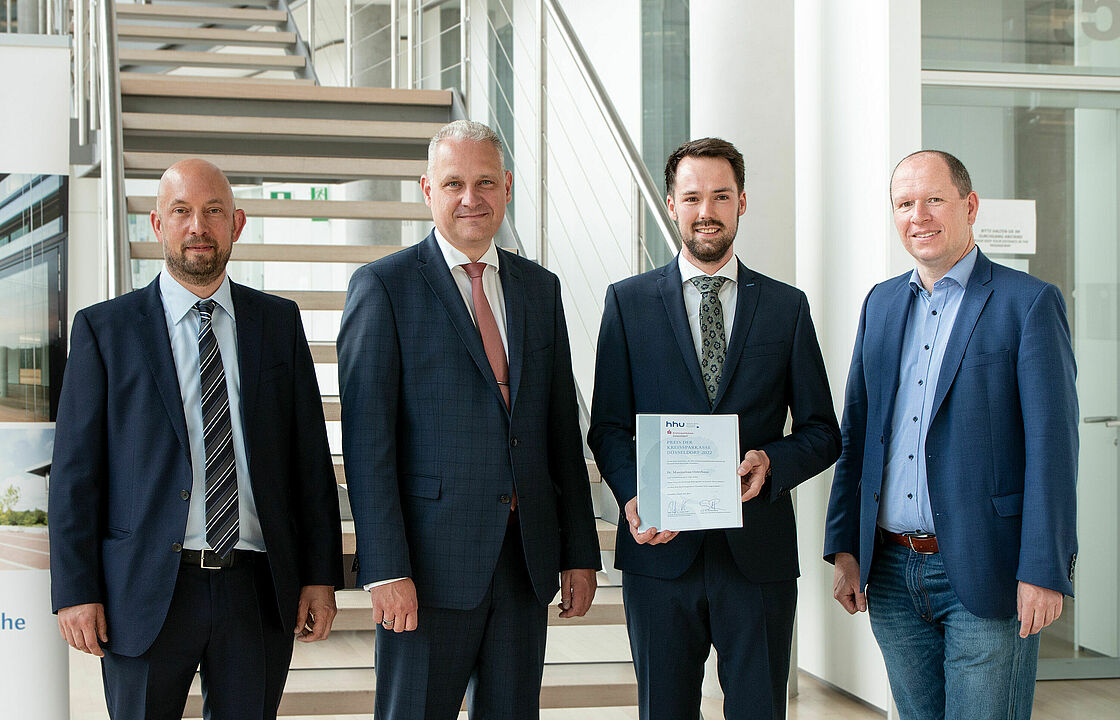In his welcoming address, the Dean, Professor Dr Stefan Süß, thanked the Kreissparkasse Düsseldorf for their long-term support of the excellent young academics in the Faculty of Business Administration and Economics. “I am delighted that we are able to honour outstanding performance in current international econometric research and methodology today and thus contribute to a field of research that has become increasingly important in business practice in recent years.”
Professor Dr Svend Reuse congratulated Maximilian Osterhaus on behalf of his organisation: “The Kreissparkasse Düsseldorf supports projects in which people have invested their heart and soul. Your outstanding thesis not only displays a passion for science, but is also evidence of great ability and perhaps even greater dedication. This effort deserves to be rewarded. I am delighted to present you with this year’s prize for the best dissertation.”
Following the addresses, Professor Dr Florian Heiß, Chair of Statistics and Econometrics and doctoral supervisor for Osterhaus, paid tribute to him: “All chapters involve methods at the forefront of international research. Approaches from statistics and econometrics are cleverly combined with approaches from the areas of machine learning and artificial intelligence, offering genuine added value and useful tools for empirical research. This piece of work is characterised by a high level of scientific diligence and goes well beyond what can be expected within the framework of a dissertation.”
Afterwards, Mr Osterhaus presented a brief overview of his thesis “Three Essays on Estimating Heterogeneity in Discrete Choice Models”:
The thesis consists of three research papers, each dealing with the non-parametric estimation of heterogeneous parameters in economic models. The chapters uncover substantial weaknesses in existing non-parametric estimators and present newly developed approaches that extend and improve existing methods for a more flexible and accurate estimation of heterogeneous parameters in economic models.
A major challenge when specifying empirical economic models is to model markets and economic agents under consideration as realistically as possible. A central part of this modelling challenge is to account for the heterogeneity across agents. In fact, it is essential that researchers model the heterogeneity across agents as flexibly as possible and that the corresponding parameters are estimated as precisely as possible in order to accurately predict the behaviour of those agents. Only then can researchers gain a better understanding of the behaviour of economic agents and the functioning of the corresponding markets, which is central to making precise evidence-based policy recommendations and taking effective regulatory measures.
Due to a lack of methodological innovations and the limited availability of large data sets in the past, many empirical studies still employ so-called parametric methods when estimating heterogeneous parameters in economic models. These estimation methods are problematic, as they require researchers to make quite restrictive assumptions about the functional form of the heterogeneity a priori – usually without having any information about the form. Thus, when employing such parametric approaches, many economic studies limit the extent of the heterogeneity across economic agents a priori.
Increasing digitization and the resulting large amounts of data available to researchers open up the possibility of studying and estimating heterogeneity at a completely new level of detail, thus gradually overcoming the limiting assumptions of existing methods. However, in order to overcome current research practices, innovative estimation methods need to be developed that are sufficiently flexible to estimate complex forms of heterogeneity from large data sets without being too computationally intensive.
Dr Maximilian Osterhaus gained his Bachelor’s degree in business economics at Julius Maximilians University in Würzburg. At the end of 2013, he completed an Erasmus semester at the University of Alicante before starting his Master’s studies in economics in Würzburg in 2014. After graduating in 2016, he moved to Düsseldorf to join the DICE as a doctoral researcher (supervised by Professor Dr Florian Heiß), where he obtained his PhD at the end of 2021. Since February 2022, he has been Assistant Professor of Econometrics (TT) at the University of Groningen (NL). His research interests lie at the intersection of statistics and economics/quantitative marketing. Currently, he is working on the application of machine learning and Deep Learning methods for the analysis of heterogeneous consumer preferences.


